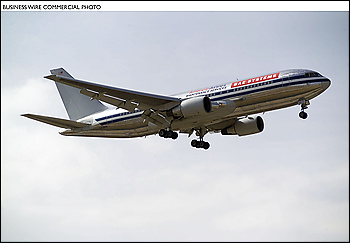Anti-Missile System to Be Tested On Some American Airlines Jets

Saturday, January 5, 2008; Page D02
As many as three American Airlines passenger jets will be outfitted this spring with laser technology intended to protect planes from missile attacks.
Officials said yesterday that the anti-missile system would not be tested on flights that carry passengers. The tests, which could involve more than 1,000 flights, will determine how the technology holds up under the rigors of flight, they said.
The anti-missile equipment will be installed on Boeing 767-200s, an airline spokesman said. American flies that model mostly between New York and San Francisco and Los Angeles.
American said it opposes putting anti-missile systems on commercial planes but agreed to the tests to understand technology that might become available.
The technology was developed for military planes. BAE Systems of Britain said yesterday that it won a $29 million contract from the Department of Homeland Security to test the Jeteye system on passenger planes.
The technology is intended to stop attacks by detecting heat from missiles, then responding in a fraction of a second by firing laser beams to jam the missiles' guidance systems.
The use of a signal to mimic a missile attack has already been tested in the air, said Tim Wagner, an American Airlines spokesman. Those tests also showed that the anti-missile system didn't interfere with the jet's other controls, officials said.
American, the nation's largest airline, has been working with BAE on the project for a couple of years. In 2006, BAE installed its hardware on a Boeing 767 that wasn't used to fly paying passengers.
Burt Keirstead, director of BAE's commercial airline protection program, said BAE's contract requires it to prove that Jeteye will operate without failure for 3,000 hours of flight, and sets a goal of 4,500 hours.
BAE has received more than $100 million in funding for aircraft-protection systems. Keirstead said BAE's technology would cost $500,000 to $1 million per plane to install.
Congress has approved funding for anti-missile research partly out of fear that terrorists armed with shoulder-fired weapons could attack jetliners as they take off and land.
American Airlines has said anti-missile defense is best achieved by stopping terrorists from getting missiles that could shoot down commercial jets and by improving security around airports.